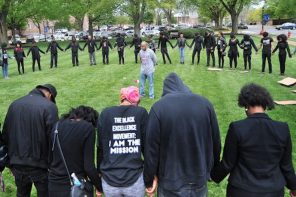I want to write just a quick response to Nicholas Laccetti’s piece on the new Poor People’s Campaign from earlier in the week, since it touched on some of my thoughts here at RD.
To start, let me say that I sincerely welcome differing opinions on the shape of the religious left—or not the religious left, I guess Laccetti’s trying to say. I particularly liked the idea of centering the “ethical framework of the poor,” at least in theory. I doubt this will be ideological enough to be truly effective, but they’re at least on the right track. In any case, though I may snipe (nothing says populist movement like dense, chewy theology and a movement with a colon in its name!), if somebody can build a better mousetrap, I’m all for it. God bless and good luck.
Which leads to point number two. I’m often asked—with varying levels of hostility—what it would take to satisfy me on the religious left. In answer, I have a rather simple, two-part test for the effectiveness of a political movement:
- Can it attract coordinated national participation that is broad-based and involves people beyond those pre-disposed to support it?
- Can it be effective in partisan politics? That is to say, can it help enact legislation, change policy, or elect or defeat elected officials?
Jack Jenkins of ThinkProgress and I have a friendly debate going: he points out, correctly, that there are many religious organizations on the state and local level who do good work on advancing progressive aims. He says this shows the religious left is back, which is wrong. I guess you might say it’s a progressive trend, and perhaps one that’s picking up steam. But it’s not a movement per se. So far, I haven’t seen much in the way of successful coordination across those areas, or structural leadership getting them to work in concert. Perhaps I’m wrong about that, but I just don’t see it on a broader level, despite the claims of the Kairos Center. (It would help if they fixed the page listing the organizations they’ve worked with.)
The requirement for broad support is as much a matter of evangelism as anything, if you’ll excuse the term. We keep hearing about how the religious left is really getting people mobilized! But it always turns out to be the same small group of activists doing the same activist things they’ve done for years, if not decades.
It seems to me that a populist movement needs to activate people who have not been previously involved in politics, to get them to use the power they have to solve problems. That’s one of the reasons I like the Indivisible model: it gave a lot of people with no outlet for resisting the Trump administration or the radical Republican agenda a way to act. Many of those people were new to political action, and the results show in how many of them are pressuring elected officials in effective ways, or themselves running for office.
The Occupy movement is a good example of how this test might be applied. It did spark national participation, and did bring in some new blood. But its decentralized structure hampered any kind of coordination, and its emphasis on process proved to be a barrier to ongoing participation. Some great things came out of Occupy, but in the end, it fizzled quickly and had only limited political effectiveness. (To be fair, it did inspire many in the Sanders wing of the Democratic party.) I can’t think of any legislation Occupy got through, and as for elections—well, you see who’s running the country at the moment.
Laccetti promises that the new Poor People’s Campaign will bring “forty days of action and civil disobedience in Washington D.C. and state capitals across the country.” If it’s successful, I’ll eat my words and admit the religious left really is a force to be reckoned with.
But Laccetti also says of their approach, “Building the unity of the poor and dispossessed is itself an act of building political power,” and here I have to be stricter.
It’s true enough that this is a political act, as is raising consciousness on issues or building social capital. But as you may have noticed, in American society, the power to affect things like economic conditions or personal liberties resides primarily in two organizations: the Democratic and Republican parties. The difference between Jesus leading a movement of the poor and today is that the Roman empire was barely responsive to the economic needs of its citizens, and not at all interested in questions of justice. It was easier to build alternative systems to care for the poor and give them a voice, because those structures simply didn’t exist. Today, we live in a much more complex economic system than the agrarian subsistence farming of Jesus’ world, and we’re much more involved in government social supports, or the lack thereof. And guess who controls the government? Right: the Republicans and the Democrats.
If you want to make a real difference in the lives of the poor, you have to be involved in government. And to be effective in your involvement in government, you have to be involved in politics, in the partisan sense that most people understand that term.
As I’ve said before, political problems have political solutions. Attempts to provide moral alternatives to the dirty business of exercising power in order to get the government to do what you want are well-meaning, but they have yet to work. I’ll be watching the Poor People’s Campaign to see if it’s different this time, but I’m not exactly holding my breath.



